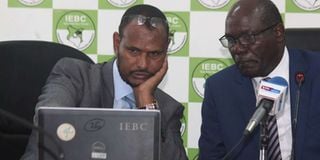Premium
IEBC in shambles: Uhuru, Raila hold on to BBI report

What you need to know:
- The next elections will be held in August 2022, which as of today is just 24 months away.
There is also a proposal to provide a mechanism for recruitment of new electoral commissioners.
President Uhuru Kenyatta and ODM leader Raila Odinga are in a dilemma over the impending referendum on the Building Bridges Initiative (BBI) recommendations even as the country waits for the report to be made public.
With the Covid-19 crisis and a battered economy, the two leaders are facing yet another big test in the Independent Electoral and Boundaries Commission (IEBC). The initial BBI report recommended an overhaul of the commission, half of whose commissioners – Vice-chairperson Connie Nkatha Maina, Roselyn Akombe, Margaret Mwachanya and Paul Kurgat -- resigned. IEBC has been running with just three commissioners namely chairperson Wafula Chebukati, Prof Abdi Guliye and Boya Molu, which is the bare minimum the commission can have, meaning that the absence of one of them cripples the commission.
Whereas President Kenyatta’s and Mr Odinga’s parties – Jubilee and ODM –agree there is a need to strengthen the electoral system, the question has been who should take charge of the electoral body. Whether the country will hold a referendum before the 2022 election is also a concern, with some legislators and Deputy President William Ruto’s allies demanding that it be conducted the same day with the 2022 General Election, a proposal the pro-BBI proponents have opposed.
CONSTITUTIONAL PROVISIONS
IEBC chairman Wafula Chebukati told The Saturday Nation: “A referendum can be held any time, provided that it complies with the constitutional provisions -- the referendum law and its attendant regulations. The commission is finalising protocols for conducting its activities.”
Jubilee secretary-general Raphael Tuju said what is needed is “a system that will work, not who is chair and commissioner”.
“We need a system that will guarantee the viability of our country because if we don’t have peace, we cannot have development,” he said.
His ODM counterpart Edwin Sifuna said that due to time constraints, the country may be forced to employ the services of the current commission only at the looming referendum vote and not the 2022 General Election. “We have a problem with some of the suppliers but we also believe that technology is not bad, but the characters in the IEBC who open those backdoors for people to tamper with technology are the worst,” Mr Sifuna said.
For three years since the last elections, Parliament has barely dealt with the legislative reforms, including some drafted by IEBC. The next elections will be held in August 2022, which as of today is just 24 months away. Currently, pending before Parliament are the Election Campaign Financing (Amendment) Bill, the Independent Electoral and Boundaries (Amendment) Bill and the Referendum Bill.
ELECTORAL BOUNDARIES
The Independent Electoral and Boundaries (Amendment) Bill seeks to amend section 36 of the Independent Electoral and Boundaries Act to guide the redrawing of electoral boundaries. There is also a proposal to provide a mechanism for recruitment of new electoral commissioners. All these reforms have stalled.
Prof Guliye says they have facilitated Parliament with all the information on areas that need review as well as the drafts of the reviews. But he says the commission too is concerned at the speed at which Parliament is dealing with the proposals.
According to Nandi Senator Samson Cherargei, Parliament seems to have frozen action on the electoral reforms and is waiting for the final BBI recommendations to guide the process. Former IEBC commissioner Lilian Mahiri-Zaja warned that the BBI’s recommendation that “political party leaders should nominate individuals” to serve as commissioners is a potential minefield and lessons should be learnt from the experiences of Angola, Mozambique and DR Congo.






